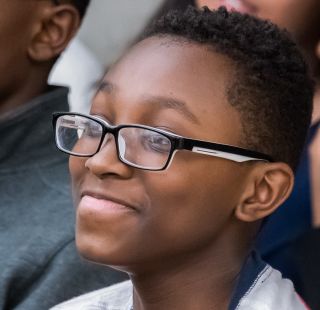Education
Schools Should Be Places of Joy
How prioritizing joy leads to genius.
Updated September 25, 2023 Reviewed by Monica Vilhauer
Key points
- Schools have become places of contention and exhaustion when they should be places of joy.
- It is the role of educators to cultivate joy and, by extension, the genius in each of our children.
- Schools can prepare students to lead lives of joy and purpose as aware, creative, and compassionate citizens.
The following is a guest post from Steve Cochrane, the former award-winning Superintendent of the Princeton public school system and current Executive Director at the Institute for Humane Education. As the school year begins, Steve's perspective is one I believe we must embrace.

In recent years, I have watched our schools become places of contention as the culture wars are fought over what and how to teach. I have watched them become places of student anxiety and educator exhaustion as the challenges in our world feel overwhelming and as so many struggle to find meaning. And yet our schools can and should be places of joy!
Twenty-five years ago as a relatively new school principal, I was inspired by Thomas Armstong’s book, Awakening Genius in the Classroom. In it, he writes, “Joy is the spark that can ignite every child’s potential genius.” He then goes on to define “genius” in an elegant and unusual way. He does not look to I.Q. points or SAT scores. Rather, he defines genius based on its derivation from the Greek word “genesis,” meaning “birth,” and the Latin word for “genial,” meaning “jovial.” He then performs a “mashup” of the two derivations to produce a beautiful new meaning of “genius” as (wait for it!) the birth of joy.
As Armstrong sees it, joy was at the heart of Einstein’s formulation of the theory of relativity; joy was at the heart of Picasso’s creative expressions on canvas; and joy was at the heart of Michael Jordan’s midair acrobatics on the basketball court. Granted, all three spent long hours practicing specific skills, but joy was the primary force that inspired them to achieve.
Joy, of course, is not only reserved for the extraordinarily accomplished. It can be seen in the first grader reading a book, the middle schooler solving a math puzzle, and the sophomore singing on stage
According to Armstrong, it is our role as educators to cultivate the joy and, by extension, the genius in each of our children. He calls for schools to be “genial” places — places free from sarcasm and judgment, places rich in opportunities for children to explore, and places that allow children some choice in how they complete a task or demonstrate their understanding.
Throughout my years as a school administrator, I held fast to Armstrong’s belief that genius begins with joy. I came to add to it, however, a complementary belief: Joy must be sustained by purpose. For joy to continue in the face of challenge and difficulty, it must be felt at a deep level. In my experience, joy abides when people recognize they are making a difference that matters — for other people, for other animals, for the planet.
In 2016, as a relatively new superintendent, I was inspired by another book. This one was The World Becomes What We Teach by Zoe Weil. Weil asserts that students find joy — and purpose — when they are guided to experience the intersection of their answers to the following three questions:
- What issues do I care about — in my school, my community, or my world?
- What skills am I good at?
- What do I love to do?
Imagine if learning were a journey of discovery in which students were invited to explore their deepest questions and concerns about the world, given opportunities to uncover their talents and passions, and then helped to acquire the new knowledge and skills they needed to achieve their goals, while simultaneously making the world a better place. Imagine if the mission of every school was to prepare all students to lead lives of joy and purpose as knowledgeable, creative, and compassionate citizens of a global society. Learning would flourish; so too, might our world.
Armstrong asks us as educators to truly believe that every child has the potential for genius; and, just as importantly, he asks us to reawaken the genius — and the joy — in ourselves.
“If you wish to spark the hidden light of genius that lives in every one of your students," Armstrong writes, “you must first find and light that spark in yourselves.”
As we begin this new school year, I know that spark is already burning in so many teachers. I have seen it in the educators we have the privilege to support with our resources here at the Institute for Humane Education. Our hope in the year ahead is to join you in sharing those sparks, in kindling that joy, and in cultivating the genius of students throughout the world.
We need that genius to solve the problems of our time, and we need you to inspire it. Thank you, teachers, for all you do. May your school year truly be one of joy.
References
Armstrong, Thomas. (1998). Awakening Genius in the Classroom. ASCD.
Weil, Zoe. (2016). The World Becomes What We Teach. New York. Lantern Publishing and Media.




